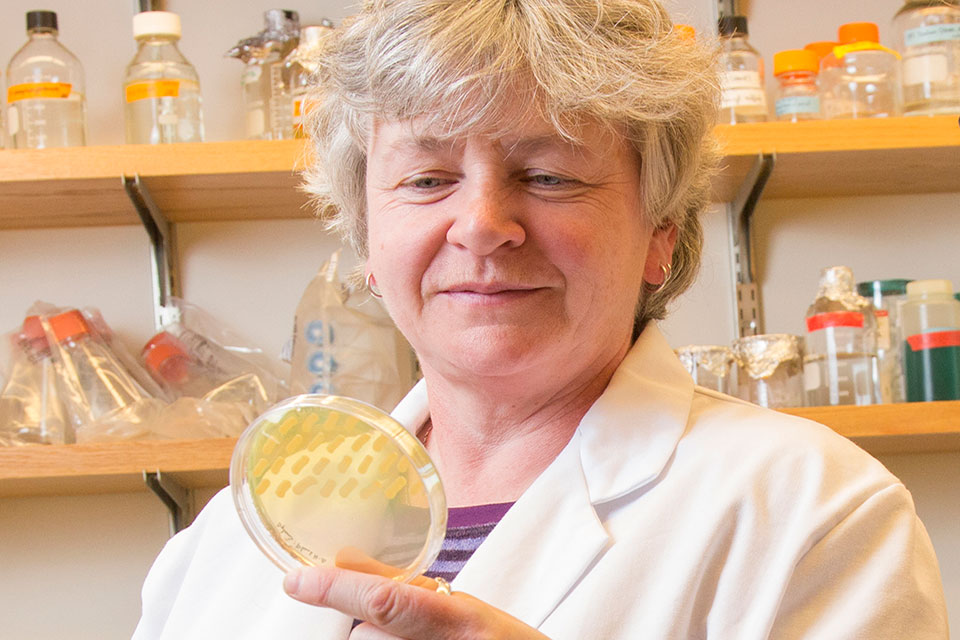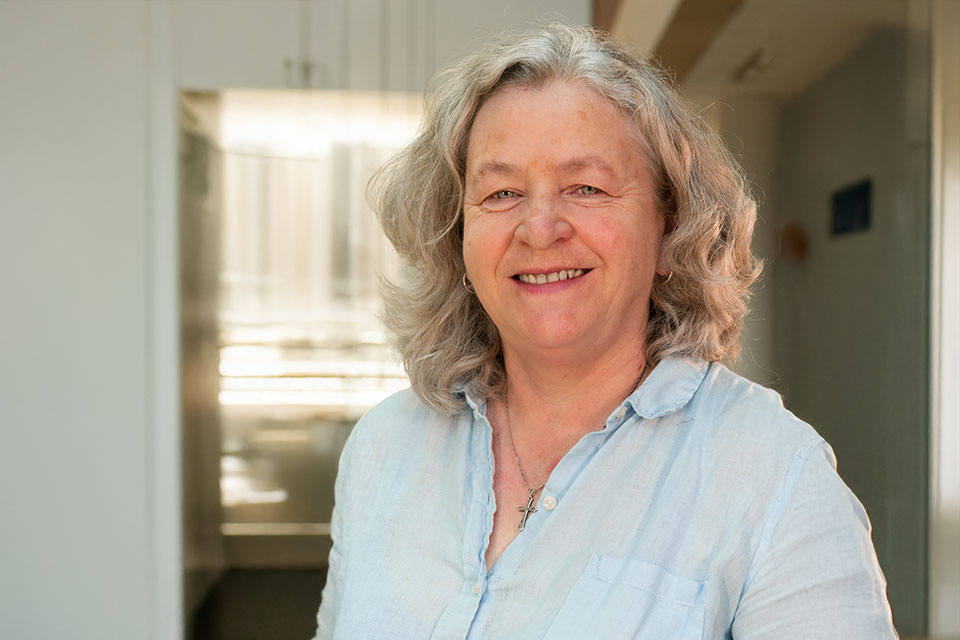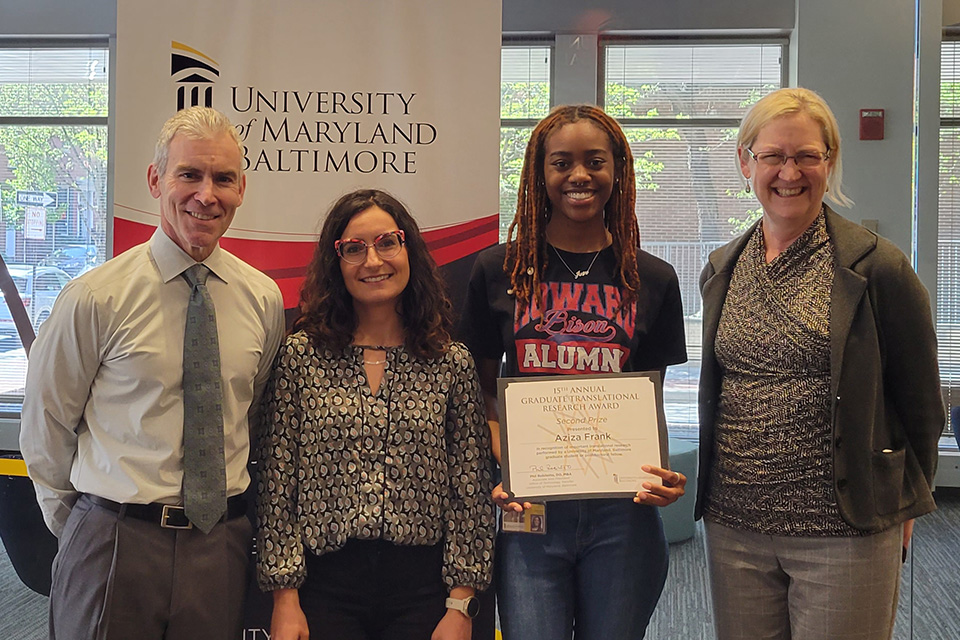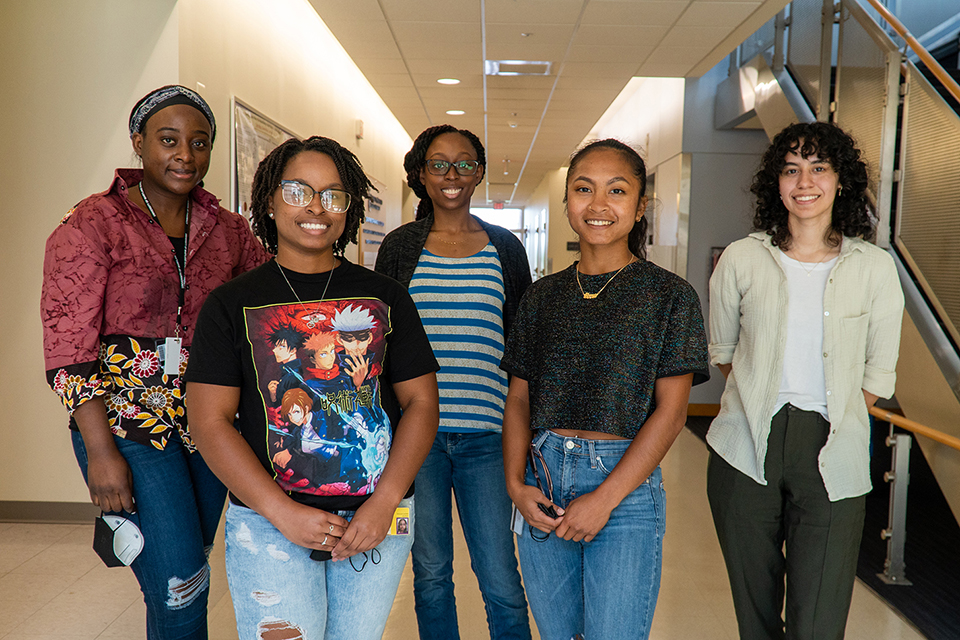SOP’s Department of Pharmaceutical Sciences Names New Emerson Chair
Dr. Angela Wilks becomes the seventh recipient of the Isaac E. Emerson Chair of Pharmaceutical Sciences since its establishment in 1927.

By Malissa Carroll
February 23, 2018
Angela Wilks, PhD, professor and program chair for chemical and biological discovery in the Department of Pharmaceutical Sciences (PSC) at the University of Maryland School of Pharmacy, has been named the new Isaac E. Emerson Chair of Pharmaceutical Sciences. Established in 1927, the endowed chair honors faculty members who have demonstrated exemplary leadership across the School and their field of research.
“Dr. Wilks’ contributions in the areas of education, research, and service to her field have been significant and sustained since she joined our department nearly 20 years ago,” says Paul Shapiro, PhD, professor and chair of PSC, who awarded the chair to Wilks. “In addition to her commitment to educating future generations of pharmacists and pharmaceutical scientists, Dr. Wilks is actively involved in research that aims to improve the treatment of serious infections among some of our most vulnerable patient populations. She has become an internationally recognized expert in her field, and is exceptionally deserving of this prestigious honor.”
The oldest endowed chair in PSC, the Isaac E. Emerson Chair in Pharmaceutical Sciences was initially established as a chair in biological testing and assay by Captain Isaac Emerson, president of the Emerson Drug Company, which created Bromo-Seltzer – an antacid designed to relieve the pain caused by heartburn, upset stomach, or acid indigestion – in 1888. It was first awarded to Marvin R. Thompson, PhG, BS, pharmacologist at the Food and Drug Administration (FDA), in 1930. Wilks is the seventh recipient of the chair in its 90-year history.
Wilks received her doctorate in biochemistry at the University of Leeds in England, where her research focused on the mechanism of heme degradation. She completed a postdoctoral fellowship and served as a research assistant professor at the University of California, San Francisco before joining the School of Pharmacy as an assistant professor in 1998. Her current research, which spans multiple disciplines, aims to understand the mechanisms by which pathogenic (disease causing) bacteria acquire and utilize heme as an iron source. Her work has led to the structural characterization of several proteins involved in heme uptake and degradation, as well as the design of potential therapeutic agents that reduce a bacterium’s virulence by targeting its iron metabolism.
In June, she collaborated with Sarah Michel, PhD, professor in PSC, on a winning proposal for the School’s Shark Tank competition that will bring together more than half of the department’s faculty members to establish a new research center focused on advancing metalloprotein and metallotherapeutics research. “Dr. Wilks is a tremendous colleague and an excellent collaborator. She truly has the department’s best interest in mind, and is willing to take that extra step to help us realize our potential,” says Shapiro.
Throughout her career, Wilks has also demonstrated a passion for educating the next generation of student pharmacists and pharmaceutical scientists. She is a respected advisor to graduate students in the PhD in PSC program, with nine students graduating under her mentorship, and a dedicated instructor in the School’s Doctor of Pharmacy (PharmD) program, for which she serves as co-course manager for PHAR 5017 (Infectious Disease and Therapeutics II).
Shapiro adds, “Dr. Wilks has trained many graduate students who now hold esteemed positions across academia, government, and industry. The impact of her mentorship on those students is undeniable.”
Despite her numerous accomplishments, Wilks remains humble about her recent recognition.
“I am truly grateful to Dr. Shapiro and my department for appointing me to this prestigious role,” says Wilks. “Being named the Isaac E. Emerson Chair of Pharmaceutical Sciences is an incredible honor that not only reflects on my past achievements as a researcher and educator, but also reminds me that this was not possible without the contributions of others, including the many talented students and post-doctoral fellows I have worked alongside. I would be remiss if I did not also acknowledge the support and friendship of my PSC colleagues. The individuals who held the chair prior to my appointment led remarkable careers in the field of pharmaceutical sciences, and it is now my responsibility to ensure that my work emulates the standard that they have set.”



